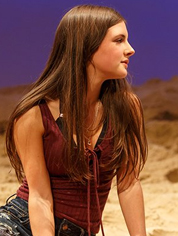

Indian Summer
Opening Night: June 8, 2016
Closing: June 26, 2016
Theater: Playwrights Horizons
Abandoned by his wayward mom, Daniel is consigned to spend summer with granddad in a Rhode Island beach town, where the locals don’t look kindly on city kids. But his hapless vacation turns around when he meets Izzy: tough-acting, back-sassing, beguiling, and taken. Gregory S. Moss’s feisty romantic comedy follows a passing fling that could last a lifetime — as impossible and charmed as an indian summer.
BUY TICKETSREAD THE REVIEWS:
June 8, 2016
Two mismatched teenagers forge a tentative friendship on a Rhode Island beach in “Indian Summer,” a melancholy, rather wan comedy-drama by Gregory S. Moss that opened on Wednesday at Playwrights Horizons. Although the play’s four characters are given sensitive readings by the fine cast, Mr. Moss’s play remains so muted that it feels like an overcast day at the shore, when you were hoping for blazing sun and frothing surf. The central characters are the 16-year-old Daniel (Owen Campbell) and the 17-year-old Izzy (Elise Kibler). They are a natural ill fit. She’s a brash local girl who comes from a large Italian-American family. He’s from out of town — one of the “summer people” Izzy and the locals deride — and has been parked by his mother with his grandfather, George (Jonathan Hadary), for an indeterminate time. Withdrawn, and exuding a terminal sense of uncertainty — unsurprisingly, given that his mother hasn’t said when she’ll be back to pick him up — Daniel nonetheless engages with Izzy when she approaches him on the beach one day. Their rapport moves gradually from tetchy and antagonistic to confiding and intimate, although neither can fully acknowledge — or perhaps even understand — how close they have become. This is in part because their budding friendship has an obvious obstacle in the person of Izzy’s boyfriend, Jeremy (Joe Tippett). He’s 10 years older than Izzy although he acts like a slightly shiftless teenager, confiding at one point to Daniel that he spends too much time getting wasted. Interspersed with the scenes between the younger characters are monologues from George, addressed directly to the audience, in which he talks (at sometimes tedious length) about the weather, the mysterious allure of the ocean and sea life. Noting the resemblance between the depths of the sea and life on solid ground, he says, “Most of life on earth is mysterious and dark and remains unseen.” All the characters have their moments of lyricism, some unlikelier than others. Izzy’s tough hide eventually cracks open to reveal the dreaming young woman within. The notion of moving to Hawaii brings a spurt of fantasy, as she imagines that “the horizon is broad and curved like a smile, and the ocean whispers.” She also expresses a sense of self-alienation, saying: “I lay in bed at night and I’m like, ‘So where is it, Izzy?’ ‘Where is your life?’ ‘Where’s it gonna start?’” The answer: “Somewhere else.” Ms. Kibler manages to make the somewhat contradictory facets of Izzy’s character seem cohesive, although Izzy is more believable when she’s doing hard-edge and spunky than when she’s reeling off flowery verbiage. As the introverted Daniel, Mr. Campbell shades his performance with glints of loneliness and confusion. (I could have done without the character’s cute-quirky fondness for crocheting to ease his anxiety.) Mr. Tippett radiates charisma as the blustery but big-hearted Jeremy, his buoyant physicality bringing welcome liveliness to the stage. And as always, Mr. Hadary is excellent, making George’s nautical-themed monologues and weather updates seem perfectly natural, if not wildly compelling. It is in these passages that Mr. Moss tends to billboard his larger themes. Speaking of the weather phenomenon of the title, for instance, George says that it’s “like a pocket of unexpected time, a little reprieve between seasons, in which things and people, lives and stories, are given a chance to collect themselves, to reconfigure and, possibly, to change.” “Indian Summer,” directed at a languid pace by Carolyn Cantor, has the laid-back feel of an Annie Baker play, with its meandering dialogue and slightly alienated characters. But it also feels vaguely formulaic, as if assembled from a kit to create, well, the kind of delicate-hued, funny-sad plays that Ms. Baker specializes in. All the talk of the ocean and its bottomless depths brings to mind the play’s flaws: it has a washed-out, watery quality, and the characters, while agreeable company, are not exactly bottomlessly interesting.
READ THE REVIEW


















